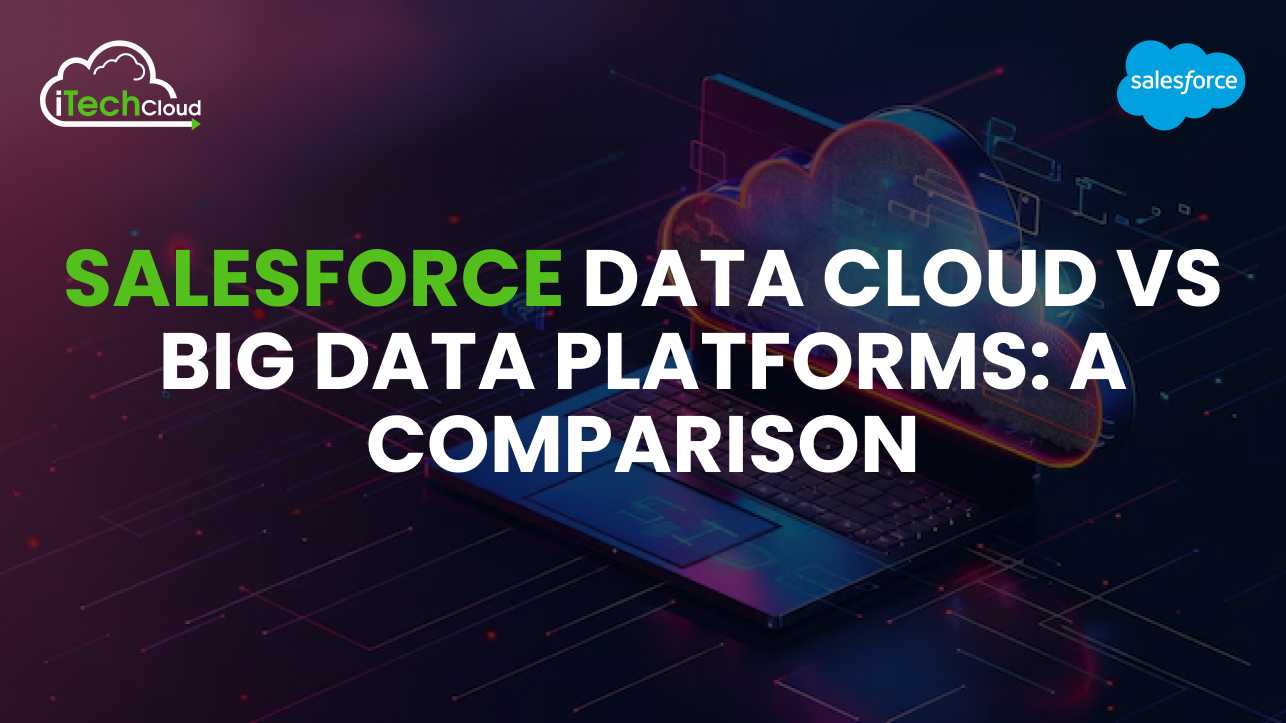
In today’s data-driven landscape, organizations rely heavily on data to drive insights, enhance customer experiences, and optimize operational efficiencies. The choice between utilizing a specialized service like Salesforce Data Cloud or leveraging traditional Big Data platforms is pivotal for many businesses. This blog explores the key differences, features, use cases, and overall effectiveness of Salesforce Data Cloud compared to Big Data platforms.
1. Understanding Salesforce Data Cloud
Salesforce Data Cloud is an integrated platform designed for data management, analysis, and visualization, primarily within the Salesforce ecosystem. It offers capabilities for real-time data ingestion, data integration, data modeling, and analytics, specifically tailored for customer relationship management (CRM) applications.
Key Features of Salesforce Data Cloud:
- Real-time Data Processing: Allows organizations to ingest and process data in real-time, ensuring that analytics are based on the most current information available.
- Data Integration: Seamlessly connects with various data sources, including Salesforce applications, third-party systems, and external databases, ensuring a unified view of customer data.
- AI and Machine Learning: Provides built-in AI capabilities through Salesforce Einstein, enabling predictive analytics and automated insights generation.
- User-friendly Interface: Offers a graphical user interface (GUI) that simplifies data modeling and visualization tasks, making it accessible for non-technical users.
- Security and Compliance: Incorporates robust security measures to protect sensitive data and ensures compliance with regulations like GDPR and HIPAA.
2. Understanding Big Data Platforms
Big Data platforms refer to frameworks designed to process and analyze vast amounts of structured and unstructured data across diverse sources. Commonly used Big Data technologies include Apache Hadoop, Apache Spark, and NoSQL databases like MongoDB and Cassandra. These platforms are engineered to handle large volumes of data, providing scalability, flexibility, and powerful processing capabilities.
Key Features of Big Data Platforms:
- Scalability: Capable of handling massive datasets across distributed computing environments, making them suitable for enterprises with extensive data needs.
- Data Variety: Supports various data types, including structured, semi-structured, and unstructured data, enabling businesses to gather insights from diverse sources.
- Advanced Analytics: Offers sophisticated analytics capabilities, including machine learning, data mining, and complex event processing.
- Customizability: Provides flexibility to customize data processing workflows and storage solutions based on specific business needs.
- Open Source: Many Big Data platforms are open-source, allowing organizations to modify and extend the functionality according to their requirements.
3. Key Differences
While both Salesforce Data Cloud and Big Data platforms offer data management and analysis capabilities, they differ significantly in their design, functionality, and target use cases.
a. Target Audience and Use Cases
- Salesforce Data Cloud: Primarily targets sales and marketing teams within organizations using Salesforce CRM. It’s designed for businesses focused on customer data, sales analytics, and marketing performance. Ideal for companies looking to integrate customer data seamlessly and utilize AI-driven insights.
- Big Data Platforms: Aimed at enterprises with complex data needs across various departments, including finance, operations, and research. Suitable for organizations that require in-depth analysis of large datasets, often for tasks like fraud detection, real-time analytics, and advanced data science projects.
b. Data Processing Capabilities
- Salesforce Data Cloud: Optimized for real-time processing within the Salesforce ecosystem, ensuring immediate availability of data for decision-making. The focus is on providing actionable insights to sales and marketing teams.
- Big Data Platforms: Designed for batch processing and real-time analytics, with the ability to handle vast volumes of data from multiple sources. They can perform complex data transformations and aggregations at scale.
c. Integration and Compatibility
- Salesforce Data Cloud: Naturally integrates with other Salesforce applications, providing a seamless experience for users. It allows for easy data import/export from various Salesforce modules.
- Big Data Platforms: Often require additional integration tools or middleware to connect with existing systems, which can introduce complexity and require more technical expertise.
d. Cost and Maintenance
- Salesforce Data Cloud: Operates on a subscription model, with pricing based on the number of users and the level of data access required. It requires less in-house maintenance, as Salesforce manages the infrastructure and updates.
- Big Data Platforms: May involve higher upfront costs due to infrastructure setup and ongoing maintenance. Organizations often need a dedicated team of data engineers and data scientists to manage the platform and ensure its effectiveness.
4. Performance and Scalability
a. Performance
- Salesforce Data Cloud: Provides high performance for customer-related data queries and analytics, making it suitable for real-time dashboards and sales reporting.
- Big Data Platforms: Can handle larger datasets and more complex analytical tasks, but performance can vary based on the infrastructure and optimization techniques employed.
b. Scalability
- Salesforce Data Cloud: Scales well within the Salesforce ecosystem but may have limitations when handling very large datasets outside of it.
- Big Data Platforms: Built to scale horizontally, allowing organizations to add more nodes to the cluster as data volume increases without significant performance degradation.
5. Security and Compliance
a. Salesforce Data Cloud
- Security: Incorporates Salesforce’s comprehensive security framework, including user authentication, data encryption, and access controls.
- Compliance: Built to comply with various data protection regulations, making it a reliable choice for organizations with stringent compliance requirements.
b. Big Data Platforms
- Security: Security measures vary by platform; organizations may need to implement additional security protocols.
- Compliance: Depending on the implementation, compliance with regulations like GDPR or HIPAA may require extra effort and resources.
6. Conclusion: Choosing the Right Solution
The decision between Salesforce Data Cloud and traditional Big Data platforms hinges on the specific needs and goals of the organization.
When to Choose Salesforce Data Cloud:
- Your organization relies heavily on Salesforce CRM and needs seamless integration with sales and marketing processes.
- You require real-time data analytics to drive immediate business decisions.
- You want an easy-to-use platform that minimizes the need for extensive technical expertise.
When to Choose Big Data Platforms:
- Your organization handles massive datasets that extend beyond customer data, requiring advanced analytics capabilities.
- You need a highly customizable and scalable solution for diverse data types and sources.
- You have the technical resources to manage and maintain a complex Big Data environment.
In conclusion, both Salesforce Data Cloud and Big Data platforms offer unique advantages and serve different business needs. By carefully evaluating your organization’s goals, data requirements, and existing infrastructure, you can select the most suitable solution to leverage data effectively and drive business success.







